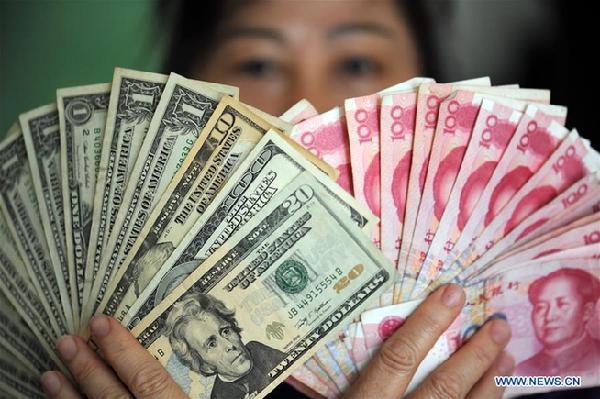
A resident shows China's RMB and U.S. dollar banknotes in Qionghai, south China's Hainan Province, Jan. 7, 2016. (Xinhua)
China pledged that it has in no way been attempting to wage a currency war by depreciating the RMB to stimulate exports, as the two-way fluctuation of the currency will soon be the new normal of the Chinese economy, Han Jun, a senior financial officer, said on January 11 in New York.
Han Jun, deputy director of China's Central Leading Office on Financial and Economic Affairs, introduced China's 13th Five Year Plan at a symposium to local audience.
According to Han, the yuan is confronting depreciation pressures from the market, which, in his view, represents a temporary trend. The two-way fluctuation -- either the rise or fall of the RMB's exchange rate -- will soon be the new normal in China's economy.
The central parity of the RMB against the U.S. dollar stumbled by two percent, or US$1, to 6.2298 yuan after China's announcement to improve the fixing mechanism on Aug. 11, 2015, registering the biggest one-day decline since 1994.
The exchange rate of the yuan against the U.S. dollar fell by 4.46 percent in 2015, the largest decline in the past few decades. In the beginning of this year, the exchange rate of the yuan against the U.S. dollar slid below 6.5 yuan, constantly hitting new lows.
"The measures we have taken to address China's currency exchange reform mark an important step made towards market reform," said Han.
He added,"I have to make it clear that China has never obtained an edge in trade by manipulating currency exchange rates."
According to Han, the fixing mechanism of the RMB exchange rate will gradually move towards the interaction of the supply and demand of the market with two-way fluctuation, which is more flexible to a certain and reasonable extent.
Based on the fundamentals of China's economy, the RMB will not continue to depreciate, Han said. China will continue to improve its market-driven mechanisms of the exchange rate, making the two-way fluctuation within a reasonable range.
On Oct. 30, 2015, the Chinese yuan was admitted to the Special Drawing Rights (SDR) after the vote inside the International Monetary Fund (IMF). With the yuan's admission to the SDR, which will take effect on Oct. 1, 2016, it will become the fifth currency after the U.S. dollar, euro, British pound and Japanese yen to be an international reserve asset.
The joining of the Chinese yuan to the SDR consolidates the stability of the yuan which is much unlikely to run out of control, Han said.
However, Han also stressed that the People's Bank of China will not rule out its intervention when the forex market deviates from the fundamentals of the economy to fluctuate dramatically and the price signals run wild.


















































